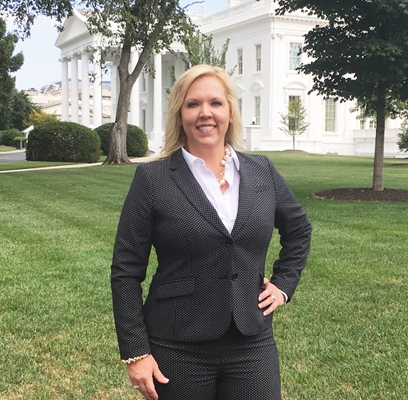ASAP marks 20 years with White House roundtable, unveiling on new logo

Stephanie Strutner
President Trump and the ONDCP Deputy Director James W. Carroll hosted a roundtable discussion last month with DFC grant awardees and Youth Representatives at the White House. Stephanie Strutner, from ASAP of Anderson attended the White House roundtable.
This year’s group represents the largest number of single-year grantees since the program’s founding.
The grants will provide local community coalitions funding to prevent youth substance use, including prescription drugs, marijuana, tobacco, and alcohol.
ASAP of Anderson is a grant recipient and will receive $125,000 in DFC grant funds to involve and engage its local community to prevent substance use among youth.
“Since our first grant awards were made in 1998, the DFC Program has continued to expand its reach in communities across the country. It is a testament to the great work DFC coalitions are doing, together with community partners that include parent groups, schools, healthcare professionals, law enforcement, businesses, and others to prevent drug use and improve the health of communities,” said Deputy Director Carroll.
“Our local DFC coalitions are a key part of this effort because they are relentless in their work to prevent youth from initiating drug use and ultimately, saving more lives.”
Strutner said, “Prevention is a powerful tool to counteract substance misuse in our community, and we will use this funding to help our youth make healthy choices. It was an honor to have an audience with the President and his staff to discuss effective prevention strategies.”
Prescription drug misuse prevention is one of the core measures of effectiveness for local DFC coalitions, and coalitions nationwide have led innovative opioid prevention initiatives.
DFC’s 2017 National Evaluation End-of-Year Report found that at least 97-percent of middle school and 94-percent of high school youth report that they have not misused prescription drugs in the past 30-days in DFC communities.
Additionally, perception of risk of prescription drug misuse was generally high (80-83-percent).
The report also found that perceived risk of misuse of prescription drugs was very similar to perceived risk of tobacco use (79-82-percent), and was higher than for both alcohol (70-73-percent) and marijuana use (51-71-percent).
Finally, the report detailed that for both middle school and high school youth, perceived peer disapproval was higher for prescription drug misuse than for any other substance.
The Drug-Free Communities (DFC) Support Program, created by the Drug-Free Communities Act of 1997, is the Nation’s leading effort to mobilize communities to prevent youth substance use.
Directed by the White House Office of National Drug Control Policy (ONDCP), the DFC Program provides grants to community coalitions to strengthen the infrastructure among local partners to create and sustain a reduction in local youth substance use.
The DFC Program provides grants of up to $625,000 over five years to community coalitions that facilitate youth and adult participation at the community level in local youth drug use prevention efforts.
Data from one national survey (2017) indicates that high school seniors are more likely to smoke marijuana than cigarettes and that 17-percent of high school seniors reported binge drinking (i.e., five or more drinks in a row) in the past two weeks.
A second national survey found similar results in 2017 with high school youth engaging in a range of risky behaviors including 30-percent reporting past 30-day alcohol use, 20-percent reporting past 30-day marijuana use, and almost 10-percent reporting smoking cigarettes in the past 30 days.
In addition, 14-percent reporting taking pain medication without a prescription or other than how prescribed at least once in their lifetime.
ASAP of Anderson held an unveiling event and luncheon Tuesday at the Anderson County Chamber of Commerce.
The organization, in a celebration of its 10-year anniversary, unveiled its new logo.


